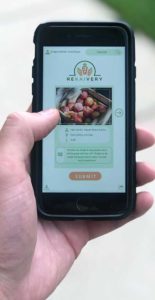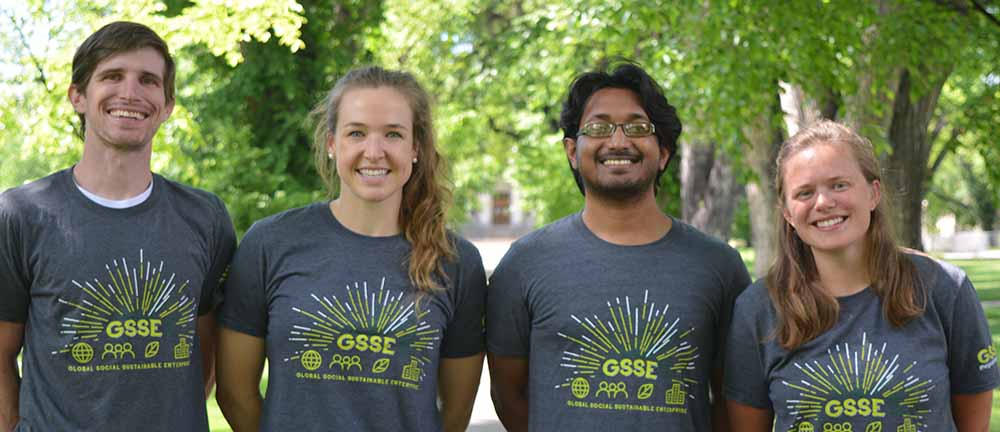ReKaivery Connects Local Farms and Cooks When Supply Chains Can’t
A little smartphone app can have tremendous impacts. Airbnb reshaped the vacation rental market. Uber and Lyft disrupted models of local transportation. Now, ReKaivery is banking that the same principles of directly connecting buyers and sellers can help local farmers and commercial kitchens reduce food waste.
The venture has its work cut out for it: Each year, about 133 billion pounds of food – or roughly 31 percent of all food – in the United States is wasted, according to estimates by the U.S. Department of Agriculture.
ReKaivery, a venture created by Impact MBA Social Entrepreneurship students as part of their summer practicum, is developing an app that helps commercial kitchens source surplus food from producers to help put it on plates before it spoils. It’s a twenty-first century solution to an age-old problem.
Accelerate Impact Award Winner
The ReKaivery team members will continue to develop their vision to reduce food waste as recipients of a $15,000 Accelerate Impact Award.
The award was one of two awards presented to Impact MBA ventures helping bootstrap the program’s budding social enterprises. The award honored ReKaivery’s plans for developing food hubs that connect local farmers with retail shoppers. Learn more about ReKaivery’s business model in ReKaivery’s company overview video.
“We are passionate about helping reduce food waste. ReKaivery is recovering food and resources destined to be wasted,” Natasha Lloyd, ReKaivery team member explained. “The way we do this is through creating value by conglomerating and condensing the information just like Expedia does with travel.”
Team members Audrey Snyder, Daniel Powell and Suman Saha join Lloyd in developing ReKaivery’s peer-to-peer approach to agricultural supply chains. The commercial food supply chain is vast and complex, and the venture doesn’t aim to replace it. Instead, the app focuses on helping producers and suppliers reroute goods when existing orders fall through. As a fallback when traditional distribution systems fail, ReKaivery serves to supplement existing systems.

Developing a venture that deals with the supply chain in the middle of the COVID-19 pandemic had its own share of problems as quarantines and a statewide restaurant shutdown effectively squashed the team’s plans to develop its professional network and conduct marketing surveys. The crisis came with a silver lining, though, as the disruption of business-as-usual highlighted the very problems ReKaivery addresses.
“It just showed how fragile our supply chain is,” Snyder said. “One thing that we saw was that farmers couldn’t get their food to market and we also saw restaurants and caterers struggled to get food.”
Agricultural producers, food distribution systems and commercial kitchens should be able to immediately identify the financial savings that come with reducing spoilage, but secondary benefits can be just as meaningful. Each pound of food that goes to waste represents misspent resources required to grow and distribute it – water, gas, packaging and labor – that have a tangible environmental impact, too.
ReKaivery embodies the business for a better world ethos as it builds its business plan and the team members found that hands-on experience – even the socially distanced version of it – played a significant role in adding value to their MBAs. From the complexities of developing a memorandum of understanding to the levels of nuance required to develop a market survey that delivers accurate responses, executing on theory – and learning new ideas – has opened the team members’ eyes to many aspects of assembling a startup.
That hands-on approach has always been central to the Impact MBA. After performing market research over the summer, ReKaivery has further developed the venture, with a soft launch that developed a small customer base. As the team tests its business plan and makes adjustments, it will be better prepared to expand to full-scale operations after graduation.
“The practicum is making us touch things that we wouldn’t have learned in any specific class, because it’s not specifically one thing or the other. Yet what we’ve learned is very crucial,” Lloyd said. “I really struggle to imagine that we would have engaged on any similar level had this been hypothetical, because the fact is now we have a model which is attracting interest and it could end up launching and being successful. So, what better way for us to invest our time into than something that could actually be our future?”

Rekaivery is just one of the ventures in the Impact MBA that is finding new ways to use business to build a better world.
Read more learn more about sustainable yak wool, greenhouse-gas busting livestock feed and more.
